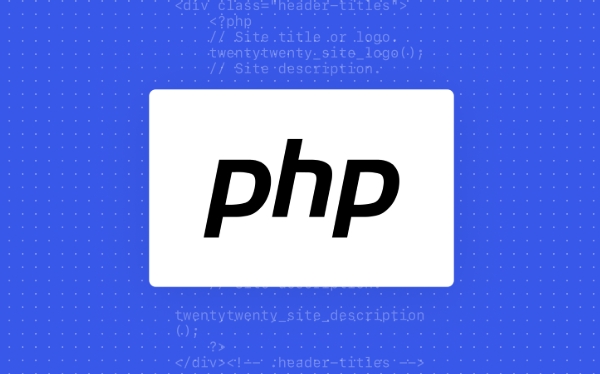It is recommended to use the DatePeriod class to traverse date ranges in PHP. 1. The DatePeriod class is introduced from PHP 5.3. Date traversal is implemented by setting the start date, end date and interval. For example, generate a date list from 2024-01-01 to 2024-01-05, which does not include the end date by default; 2. If you need to include the end date, you can adjust the end date or set the INCLUDE_END_DATE parameter; 3. The manual loop method can also complete the traversal using the DateTime object and the modify() method, which is suitable for scenarios where step size needs to be flexibly controlled; 4. Note that time zone issues should be explicitly set to avoid the system's default time zone affecting the results; 5. PHP automatically handles the difference in leap years and month days without additional processing. The two methods have their own advantages and disadvantages, just choose the appropriate method according to your needs.

Processing date ranges is actually quite common in PHP, such as generating calendars, stating reports, or scheduling tasks. If you want to know how to iterate over a date interval, using the built-in DatePeriod class is the most straightforward way.

Use DatePeriod to traverse date ranges
PHP has introduced the DatePeriod class since 5.3, which is specifically used to traverse a date or time range. The basic idea is to set the start date, end date and interval (such as daily and weekly), and then hand it over to DatePeriod for processing.

For example: If you want to go from 2024-01-01 to 2024-01-05, take one step every day, you can write it like this:
$startDate = new DateTime('2024-01-01');
$endDate = new DateTime('2024-01-05');
$interval = new DateInterval('P1D'); // Once a day $period = new DatePeriod($startDate, $interval, $endDate);
foreach ($period as $date) {
echo $date->format('Ym-d') . PHP_EOL;
} Note that the end date is not included by default . In other words, the above code is only output to 2024-01-04. If you want to include the last day, you can add $endDate one day later, or set the third parameter to DatePeriod::EXCLUDE_START_DATE or DatePeriod::INCLUDE_END_DATE to control behavior.

Manual loops can be done
If you don't want to use DatePeriod , you can also write a loop yourself and add or subtract the time step by step using the DateTime object. Although the code is more complex, the logic is more intuitive.
for example:
$startDate = new DateTime('2024-01-01');
$endDate = new DateTime('2024-01-05');
while ($startDate <= $endDate) {
echo $startDate->format('Ym-d') . PHP_EOL;
$startDate->modify(' 1 day');
}The advantage of this method is that you can control step size more flexibly, such as not skipping certain situations every day. The disadvantage is that it is a little bit more verbose, and it is easy to cause a dead cycle due to errors in boundary judgment.
Frequently Asked Questions and Notes
Time zone problem : If you do not specify a time zone, the server's system time zone will be used by default. It is recommended to set explicitly, such as:
$timezone = new DateTimeZone('Asia/Shanghai'); $startDate = new DateTime('2024-01-01', $timezone);
Format output : When using
format()method, remember not to write the parameters incorrectly. Commonly used ones include'Ym-d','d/m/Y', etc.Be careful when ending conditions : especially when you use
modify()oradd(), don't make it into an infinite loop.You don’t have to worry about the length of the leap year/month : PHP has helped you handle the details of the days and leap year in each month, so you can add and subtract it with confidence.
Basically that's it. Using DatePeriod is the most recommended way, it is simple and not easy to make mistakes. The manual approach is suitable for situations where you need more granular control. Both methods are good, depending on how you use them.
The above is the detailed content of php iterate over a date range. For more information, please follow other related articles on the PHP Chinese website!

Hot AI Tools

Undress AI Tool
Undress images for free

Undresser.AI Undress
AI-powered app for creating realistic nude photos

AI Clothes Remover
Online AI tool for removing clothes from photos.

Clothoff.io
AI clothes remover

Video Face Swap
Swap faces in any video effortlessly with our completely free AI face swap tool!

Hot Article

Hot Tools

Notepad++7.3.1
Easy-to-use and free code editor

SublimeText3 Chinese version
Chinese version, very easy to use

Zend Studio 13.0.1
Powerful PHP integrated development environment

Dreamweaver CS6
Visual web development tools

SublimeText3 Mac version
God-level code editing software (SublimeText3)

Hot Topics
 How do I implement authentication and authorization in PHP?
Jun 20, 2025 am 01:03 AM
How do I implement authentication and authorization in PHP?
Jun 20, 2025 am 01:03 AM
TosecurelyhandleauthenticationandauthorizationinPHP,followthesesteps:1.Alwayshashpasswordswithpassword_hash()andverifyusingpassword_verify(),usepreparedstatementstopreventSQLinjection,andstoreuserdatain$_SESSIONafterlogin.2.Implementrole-basedaccessc
 How can you handle file uploads securely in PHP?
Jun 19, 2025 am 01:05 AM
How can you handle file uploads securely in PHP?
Jun 19, 2025 am 01:05 AM
To safely handle file uploads in PHP, the core is to verify file types, rename files, and restrict permissions. 1. Use finfo_file() to check the real MIME type, and only specific types such as image/jpeg are allowed; 2. Use uniqid() to generate random file names and store them in non-Web root directory; 3. Limit file size through php.ini and HTML forms, and set directory permissions to 0755; 4. Use ClamAV to scan malware to enhance security. These steps effectively prevent security vulnerabilities and ensure that the file upload process is safe and reliable.
 What are the differences between == (loose comparison) and === (strict comparison) in PHP?
Jun 19, 2025 am 01:07 AM
What are the differences between == (loose comparison) and === (strict comparison) in PHP?
Jun 19, 2025 am 01:07 AM
In PHP, the main difference between == and == is the strictness of type checking. ==Type conversion will be performed before comparison, for example, 5=="5" returns true, and ===Request that the value and type are the same before true will be returned, for example, 5==="5" returns false. In usage scenarios, === is more secure and should be used first, and == is only used when type conversion is required.
 How do I perform arithmetic operations in PHP ( , -, *, /, %)?
Jun 19, 2025 pm 05:13 PM
How do I perform arithmetic operations in PHP ( , -, *, /, %)?
Jun 19, 2025 pm 05:13 PM
The methods of using basic mathematical operations in PHP are as follows: 1. Addition signs support integers and floating-point numbers, and can also be used for variables. String numbers will be automatically converted but not recommended to dependencies; 2. Subtraction signs use - signs, variables are the same, and type conversion is also applicable; 3. Multiplication signs use * signs, which are suitable for numbers and similar strings; 4. Division uses / signs, which need to avoid dividing by zero, and note that the result may be floating-point numbers; 5. Taking the modulus signs can be used to judge odd and even numbers, and when processing negative numbers, the remainder signs are consistent with the dividend. The key to using these operators correctly is to ensure that the data types are clear and the boundary situation is handled well.
 How can you interact with NoSQL databases (e.g., MongoDB, Redis) from PHP?
Jun 19, 2025 am 01:07 AM
How can you interact with NoSQL databases (e.g., MongoDB, Redis) from PHP?
Jun 19, 2025 am 01:07 AM
Yes, PHP can interact with NoSQL databases like MongoDB and Redis through specific extensions or libraries. First, use the MongoDBPHP driver (installed through PECL or Composer) to create client instances and operate databases and collections, supporting insertion, query, aggregation and other operations; second, use the Predis library or phpredis extension to connect to Redis, perform key-value settings and acquisitions, and recommend phpredis for high-performance scenarios, while Predis is convenient for rapid deployment; both are suitable for production environments and are well-documented.
 How do I stay up-to-date with the latest PHP developments and best practices?
Jun 23, 2025 am 12:56 AM
How do I stay up-to-date with the latest PHP developments and best practices?
Jun 23, 2025 am 12:56 AM
TostaycurrentwithPHPdevelopmentsandbestpractices,followkeynewssourceslikePHP.netandPHPWeekly,engagewithcommunitiesonforumsandconferences,keeptoolingupdatedandgraduallyadoptnewfeatures,andreadorcontributetoopensourceprojects.First,followreliablesource
 What is PHP, and why is it used for web development?
Jun 23, 2025 am 12:55 AM
What is PHP, and why is it used for web development?
Jun 23, 2025 am 12:55 AM
PHPbecamepopularforwebdevelopmentduetoitseaseoflearning,seamlessintegrationwithHTML,widespreadhostingsupport,andalargeecosystemincludingframeworkslikeLaravelandCMSplatformslikeWordPress.Itexcelsinhandlingformsubmissions,managingusersessions,interacti
 How to set PHP time zone?
Jun 25, 2025 am 01:00 AM
How to set PHP time zone?
Jun 25, 2025 am 01:00 AM
TosettherighttimezoneinPHP,usedate_default_timezone_set()functionatthestartofyourscriptwithavalididentifiersuchas'America/New_York'.1.Usedate_default_timezone_set()beforeanydate/timefunctions.2.Alternatively,configurethephp.inifilebysettingdate.timez






